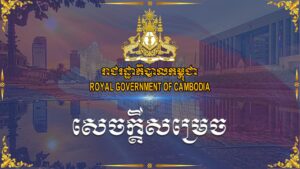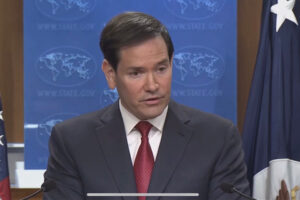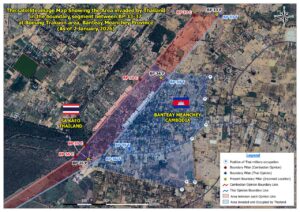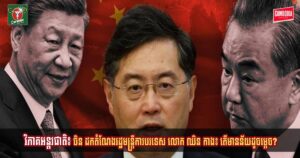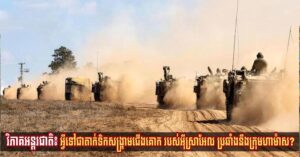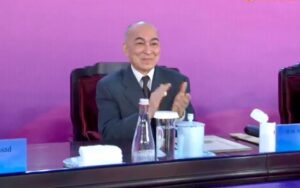Khmer Time: Thai Prime Minister’s incapability to manage internal disunity
Thailand’s Prime Minister Paetongtarn Shinawatra has been struggling to manage disunity both within her cabinet as well as with the Royal Thai Armed Forces. She is also incapable of controlling the ultra-nationalist movement in Thailand.
In late March, Thailand’s Prime Minister Paetongtarn Shinawatra survived a no-confidence vote in parliament, defeating a challenge from opposition parties which accused her of being a puppet of her father, ex-premier Thaksin Shinawatra. After a two-day debate in which the opposition attacked 38-year-old Paetongtarn’s management of the economy and national security, as well as her inexperience, MPs voted down the no-confidence motion by 319 votes to 162, with seven abstentions.
Inside her cabinet, tension has been simmering. The relations between Prime Minister Paetongtarn Shinawatra of the Pheu Thai Party and Deputy Prime Minister Anutin Charnvirakul of the Bhumjaithai Party had been seen as a marriage of convenience to maintain a grip on power. The recent rumblings of discontent have everyone wondering just how long this alliance can hold. With Bhumjaithai facing tension over alleged vote-fixing in the 2024 Senate election, the coalition’s stability hangs in the balance. Moreover, the impending consideration of the 2026 budget bill is causing a stir. There was a rumor suggesting that Bhumjaithai might not support the bill and threatens to dissolve the House and unravel this marriage of convenience.
Both sides were discussing about cabinet reshuffle and on 17 June, Interior Minister Anutin Charnvirakul said that the interior portfolio was still with his Bhumjaithai party, as agreed during the formation of the coalition government. Asked if the Bhumjaithai party was ready to switch to the opposition camp, if it loses the interior portfolio, Anutin, also Bhumjaithai party leader, said “yes”.
On 19 June, The Bhumjaithai Party announced its withdrawal from Thailand’s coalition government but with a different reason: the leak of a phone conversation between the Thai prime minister and former Cambodian Prime Minister Samdech Techo Hun Sen.
Border tension with Cambodia was used as a convenient reason for the breakup of a marriage of convenience between Thai coalition parties.
Regarding the disunity between the civilian government and the Thai armed forces, it was laid bare by the Thai prime minister in the leaked phone conversation suggesting that the army did not support her leadership or even oppose her.
The disunity between them is a no-brainer.
Despite Thailand’s constant calls for negotiation, Cambodian side has difficulty in understanding who call the final shot in Thailand, the civilian government or the military. Bilateral negotiations related to border have been stalled for over a decade without any progress at all.
According to a survey conducted by the Asian Vision Institute, 73.8% of Cambodian people believed that the border disputes were provoked by the Thai military, and 23.1% believed that they were provoked by extremist Thai nationalists. Notably, Cambodian people believed that the government of Thailand has little power in governing the state of Thailand.
Thai military made a unilateral decision to abruptly close the Poipet International Gate in the afternoon of 7 June without providing official notification to the Cambodian side.
On 9 June, both sides agreed to redeploy troops to ease tension.
In Cambodia, former prime minister Hun Sen had to explain to the public that “troop redeployment” was different from “troop withdrawal”. The Cambodian public was criticizing the government for fear of retreat from the foreign incursion.
In the leaked phone communication, former prime minister Samdech Techo Hun Sen expressed his frustration that troop redeployment was meant to ease tension but still Thai military maintained its unilateral border closure.
The position of the Cambodian government was clear and easy. If Thailand was the initiator of unilateral border closure, then Thailand should withdraw its unilateral decision. Samdech Techo Hun Sen even offered his head as guarantee that Cambodia would open all border crossings within five hours if Thailand announces the withdrawal of its unilateral border closure. He added that there is no need to even negotiate with Cambodia at all on this point.
If Thailand ties the rope, it will just have to untie it itself.
What was clear from the phone communication on 15 June was that Thai prime minister had no control over the military. Despite receiving a clear message from Samdech Techo Hun Sen, she could not exert any influence towards the military and Thailand still maintains its unilateral border closure.
From the observation of Cambodia, it has been a hard question to identify whether Prime Minister Paetongtan is truly incompetent in controlling the army, or the army maintains the conventional disobedience towards civilian government, or both sides are playing “good cop and bad cop” negotiating tactics with Cambodia.
Whatever it is, no one can negotiate when one side has no full power to decide or implement the agreed decisions.
The fate of Thai prime minister continues to be decided by the military, and it seems their internal friction is getting worse beyond repair.
Thai prime minister was not only incapable of controlling the army. She was also incapable of controlling Thai ultranationalists such as Sondhi Limthongkul who has been the public enemy of Cambodia that stands to lead ultranationalist movement against Cambodia. The controversial figure even called for the army to invade Angkor Wat but still Thai government has not done anything to control such ultra-nationalist movement. Instead, Thai prime minister created a working group to monitor Samdech Techo Hun Sen’s Facebook. There were extremists who called on Thai government to support Cambodian opposition to overthrow the current Cambodian government.
There was also a call by a Thai ultranationalist to claim back Koh Kong province from Cambodia because, according to him, France took it from Thailand and that there are many people that can speak Thai in Koh Kong province at the moment.
With such mentality of a neighbor, there is no chance that both countries would live in peace. Yet, no one punish such extremist remarks in Thai society. It is a tacit approval for ultra-nationalism and it is visible that popularity of such individuals still soars within Thai politics despite them being the apparent enemy of international law and Cambodia.
Cambodia has been consistent in calling for avoidance of ultra-nationalism, racism and hate speech. Both Samdech Techo Hun Sen and Samdech Thipadei Hun Manet have called on Cambodians not to fall into xenophobia against Thai people. In fact, there is no incident of harassment by Cambodians towards Thai nationals in Cambodia, Thai negotiators who came to Cambodia, as well as towards Thai embassy and companies.
Prime Minister Paetongtarn has been incapable of controlling her coalition, Thai military and ultra-nationalist movement in Thailand. With such condition, Cambodia does not know who should be its reliable interlocutor to settle the border issues.
Cambodia wishes to settle the issues in a clear manner not according to the domestic political environment of Thailand. Border negotiations are for the sake of future generations and they should not become a scapegoat of Thailand’s domestic political theater.
That is why 99.8% of the Cambodian people support the government in resolving the border disputes in the Mom Bei area, as well as the Ta Moan Thom, Ta Moan Tauch and Ta Krabei temples, through the International Court of Justice (ICJ).
Chan Kunthiny is a Phnom Penh-based geopolitical and security analyst. The views and opinions expressed here are the author’s own.


